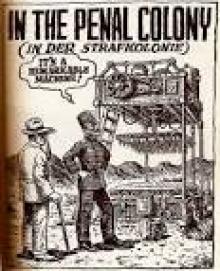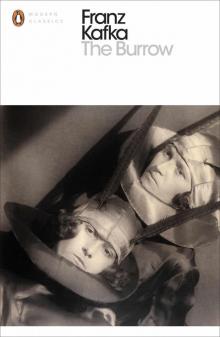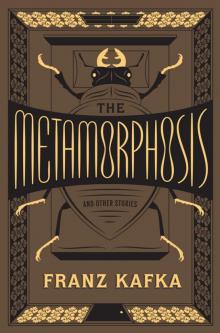- Home
- Franz Kafka
Amerika Page 14
Amerika Read online
Page 14
Karl was very glad that the lift to which he had been assigned was one that travelled to the upper floors only, so that he would be spared any dealings with the wealthier and more demanding hotel guests. Granted, he would learn less as well, and so it was only good for a start.
By the end of the first week, Karl could see that he was well up to the job. The brass trim on his lift was the most highly polished of all, none of the other thirty lifts could compare with it, and it might have gleamed still more if the boy who worked on the same lift as him had been anything like as conscientious, instead of taking Karl’s diligence as an excuse for his own sloppiness. He was an American by birth, Rennel was his name, a vain boy with dark eyes and smooth, somewhat concave cheeks. He had an elegant suit of his own, in which on his evenings off he would hurry, lightly perfumed, into the city; occasionally too he would ask Karl to fill in for him in the evening, as he had to go off for family reasons, and it didn’t bother him that his appearance seemed to be rather at variance with such claims. In spite of that, Karl liked him, and he liked it when, on such evenings, Rennel would stand around by the lift with him in his going-out clothes, say a few more words of apology as he pulled his gloves over his fingers and then stroll off down the corridor. Besides, in covering for him, Karl was only doing a favour, as seemed prefectly natural to start off with, for a colleague older than himself, it wasn’t meant to become a permanent state of affairs. For this continual riding up and down in the lift was tiring enough anyway, and in the evening there were almost no interruptions.
Soon Karl also mastered the quick, deep bows that the lift-boys were expected to perform, and he could catch tips in mid-air. The money vanished into his waistcoat pocket, without anyone being able to tell from his expression whether it was a large sum or small. For ladies he opened the door with a little show of gallantry, and swung himself into the lift slowly behind them, as they tended to get into it more hesitantly than men, afraid for their dresses, their hats and wraps. During the ride, he would stand, as this was least obtrusive, hard by the door, with his back turned to the guests and hold the handle so as to be able to push it aside the instant the lift stopped, without causing any undue alarm. It was rare for anyone to tap him on the shoulder during a ride to ask for some piece of information, in which case he would promptly turn round, as though expecting it, and reply in a clear voice. Often, in spite of the great number of lifts, especially after the theatres let out, or after the arrival of certain express trains, there would be such a crush, that barely had the guests got out at the top than he had to race back down to pick up more waiting downstairs. By pulling at a wire that ran through the lift, he had the option of increasing the usual speed, although this was forbidden by the lift regulations, and was supposed to be dangerous as well. Accordingly Karl never did it when he had any passengers on board, but when he had dropped some off upstairs, and there were others waiting below, he would be ruthless, and pull strongly on the wire, hand over hand, like a sailor. He knew that the other lift-boys did this as well, and he didn’t want to lose his passengers to the other boys. Certain guests, who had been staying in the hotel for some time, which seemed to be quite common practice here, would occasionally smile at Karl, to show that they recognized him as their lift-boy. Karl was grateful for their attention, but took it with a stern face. Sometimes, when there was less traffic, he was able to take on little special errands, for instance, in the case of a hotel guest who didn’t want to go all the way back up to his room to fetch some small item that he’d left behind, he would rush up alone in the lift, which seemed particularly close to him at such moments, step into the strange room, which usually contained extraordinary things he had never seen before, strewn around or hanging from coat-hangers, breathe the characteristic smell of a particular soap, perfume or mouthwash, and without loitering at all, hurry back down again, having found the object in spite of the generally unclear instructions. He was often sorry not to be able to take on larger commissions, because there were waiters and errand-boys specially set aside for these, who did their work on bicycles or even motorbikes, it was only for errands involving the rooms and dining-rooms or gaming-rooms that Karl was able, unless otherwise engaged, to be used.
When he came off the twelve hour shifts, at six in the evening on the first three days, and at six in the morning for the three following, he was so tired that he went straight to bed without paying any attention to anybody else. He was in the dormitory for lift-boys. The Head Cook, whose influence wasn’t perhaps as great as he had thought that first evening, had endeavoured to find him a room of his own, and might even have succeeded, but when Karl saw the trouble it put her to, and the number of times she spoke on the telephone to his superior, that terribly busy Head Waiter, on his account, he abandoned the idea and convinced the Head Cook that he was serious by arguing that he didn’t want to incur the envy of the other boys by obtaining a privilege he wouldn’t have been able to secure for himself.
Now this dormitory was anything but a quiet place to sleep. For, since each of them divided up his twelve hours off, between eating, sleeping, pleasure and work on the side, there was a loud and continual commotion in the dormitory. There were some who were asleep, with the blankets pulled up over their ears in order to eliminate the noise; but if one of these was awakened, then he would scream so angrily at the shouting of the others, that none of his fellow sleepers could remain so. Almost every one of the boys owned a pipe, pipes were their luxury, Karl had acquired a pipe for himself too, and soon got a taste for it. Now smoking on duty was not allowed, and as a result everyone in the dormitory who wasn’t asleep would be smoking. Each bed was swathed in its own individual cloud of smoke and a general pall hung over the whole room. In spite of a theoretical agreement to that effect, it proved impossible to maintain the principle of having light at only one end of the room. If that suggestion had prevailed, then the ones who wanted to sleep could have done so quietly in the darkness of one half of the room – which was a large one, containing forty beds – whereas the others could have played dice or cards in the lighted half, and whatever else they needed a light for. If one whose bed was in the light part of the room wanted to sleep, he could have lain down on a vacant bed in the dark half, because there were always sufficient beds, and no one ever objected to the temporary borrowing of a bed by someone else under such circumstances. But there was never a night on which such a division was practised. There would always be a couple of boys, say, who having used the darkness to get some sleep, then felt like a game of cards in their beds, laying a board between them and of course switching on a handy electric light, whose piercing beams would startle the sleepers on whom they fell and wake them up. A sleeper would toss and turn for a while, but in the end there was nothing for it but to start a game with his neighbour, who had been similarly awakened, and with additional illumination. And of course all puffed away on their pipes. There were some – Karl usually among them – who wanted to sleep at any price, and who instead of laying their heads on their pillows covered their heads or rolled them inside their pillows. But how could you remain asleep when your next door neighbour would get up in the dead of night in order to seek some pleasure in town before the beginning of his shift, when he washed at the ewer at the end of your own bed, splashing loudly, when he not only pulled on his boots with much clattering, but stamped his feet to get them properly in – almost all of them had boots that were too small for them despite being of American design – and then finally, missing some item of apparel, raised the pillow of the sleeper, who by now would be long awake and only waiting to have a go at him. And then they were all athletic, young, strong lads, reluctant to let slip any opportunity for physical exercise. So you could be sure that when a great noise startled you out of your night’s sleep you would find two boys wrestling on the floor beside your bed, bright lights, and all around standing up on their beds in shirt and underpants, giving expert commentary. In the course of one such nocturnal bout, one of the combatants
fell across Karl’s bed as he lay sleeping, and the first thing Karl saw on opening his eyes was the blood pouring from the boy’s nose, and soaking the bedclothes before anything could be done to prevent it. Often Karl would spend his entire twelve hours attempting to get a couple of hours of sleep, though he was also very tempted to join in the amusements of the others; but he kept thinking that in their lives they had an advantage over him, which he needed to make up for by greater industry and a certain self-denial. Even though his sleep was very important to him, principally for the sake of his work, he didn’t complain about conditions in the dormitory either to the Head Cook or to Therese, because in the first place all the boys more or less endured them without serious complaint, and secondly the torments of the dormitory were an integral part of his job as lift-boy, which he had gratefully accepted from the hands of the Head Cook.
Once a week, when the shift pattern changed, he got twenty-four hours off, which he used to pay one or two visits to the Head Cook and to have a few little chats with Therese whose precious free time he would share, in some corner somewhere, in the corridor, or more rarely in her room. Sometimes too he would accompany her on her errands in the city, though these had to be done in a great hurry. They would almost run, Karl carrying her bag, to the nearest underground station, the ride was over in a flash, as though the train was being pulled by an irresistible force, and already they were out, clattering up the stairs instead of waiting for the lift which was too slow for them, the great squares appeared, out of which the roads flew apart in stellar patterns, and with them a bewildering confusion of traffic all of it flowing in straight lines, but Karl and Therese hurried, close together, into various offices, laundries, storerooms and shops, to place orders or make complaints where it wasn’t possible by telephone, things that were usually less than momentous. Therese soon realized that Karl’s assistance on these missions was not to be despised, rather it brought a great acceleration to many things. In his company, she was never made to wait, as happened often when she was alone, for over-occupied business people to listen to her. He stepped up to the counter and drummed on it with his knuckles until someone came, he shouted in his utterly distinctive, over-precise English across walls of humanity, he went unhesitatingly up to people, even if they had arrogantly withdrawn into the furthest recesses of seemingly endless premises. He didn’t do it out of hubris, and he respected resistance, but he felt he was in a strong position, the Hotel Occidental was a client that couldn’t be mocked, and finally Therese, for all her business experience, needed his help. ‘I wish you could always come along with me,’ she said sometimes, smiling happily when they returned from a particularly well executed campaign.
Only on three occasions during the month and a half that Karl spent in Ramses did he stay longer than a couple of hours in Therese’s little room. It was of course far smaller than any of the Head Cook’s rooms, the few belongings of Therese’s were grouped around the window, but after his experiences in the dormitory, Karl keenly appreciated the value of a comparatively quiet room of one’s own, and though he didn’t say anything to Therese directly, she still understood how much he liked her room. She had no secrets from him, and indeed it would have been difficult for her to have any after her visit to him that first evening. She was an illegitimate child, her father was a builder’s foreman, and had sent for the child and her mother from Pomerania, but then as though that represented the limit of his obligation, or he had expected other people than the exhausted woman and sickly child he greeted at the harbour, he had emigrated to Canada shortly after their arrival, without much explanation, and they had received no letter nor any news of him, which wasn’t all that surprising as they were hopelessly lost in the cramped ghetto in the Eastern part of New York.
Once – Karl was standing next to her at the window, gazing down on the street – Therese had talked about the death of her mother. The way that one winter evening her mother and herself – she must have been five at the time – each carrying a bundle, chased down the street, looking for a place to sleep. The way her mother at first led her by the hand (there was a blizzard and it was hard to make any headway) till her hand relaxed and she let go of Therese without looking to see what became of her, and she had to strive to grab hold of her mother’s skirts. Often Therese stumbled and even fell but her mother seemed possessed and wouldn’t stop. And the snowstorms in the long straight streets of New York! Karl hadn’t experienced a winter in New York. If you walk into a swirling headwind, you can’t open your eyes even for a second, the wind is incessantly rubbing snow in your face, you walk and walk and get nowhere, it’s quite desperate. Of course a child has a certain advantage over a grown-up, it can walk underneath the wind, and is still able to enjoy everything. And so Therese hadn’t quite been able to understand her mother at the time; and she was firmly convinced that if she had behaved more sensibly that evening with her mother – but she was just a little girl – she wouldn’t have had to suffer such a miserable death. Her mother had already been without work for two days, they didn’t have a penny piece, they had spent the day in the open without a bite to eat, and all they had in their bundles were useless rags which they were only afraid to throw away because of superstition. Now her mother had been offered work on a building site the following morning, but as she told Therese all day long, she was afraid she wouldn’t be able to take up this good opportunity because she was dead tired, that morning to the alarm of passers-by on the pavement she had coughed up a lot of blood, and all she wanted was to get in the warm somewhere and rest. But on this one evening it was proving impossible to find a place. Anywhere that the janitor hadn’t evicted them from the doorway of a building, and in which there was at least a little protection from the weather, they would hurry through narrow icy passages, climb long flights of stairs, circle the narrow courtyards, knocking randomly on doors, sometimes not daring to speak, at others asking anyone they met, and once or twice her mother would squat down breathless on the steps in a quiet staircase, pull Therese, in spite of her resistance, to herself, and press her lips against her so hard that it hurt. When she knew later that those were the last kisses, she couldn’t understand how even if she were a little shrimp, she could have been so blind as not to see that. In some of the rooms they passed, the doors were open to let out some suffocating fumes, and from the haze that filled the room like smoke from a fire, a human figure would loom in the doorway, and either with a curt word or by its mute presence communicate the impossibility of finding shelter in that particular room. Looking back it seemed to Therese that her mother had only been serious in her search for the first few hours, because after midnight or thereabouts, she no longer asked anyone, although she didn’t stop rushing around till dawn, with short interruptions, and even though there is always life in those buildings where neither the gates nor the doors to individual rooms are ever locked, and you keep running into people. Of course it wasn’t as though they made much headway with their scurrying about, it was simply the utmost exertion of which they were capable, and perhaps in reality it was no more than a crawl. Nor could Therese be sure whether they had tried their luck in twenty houses between midnight and five o’clock, or two or even just one. The corridors of those tenements are cleverly designed to make the most of the space, but without regard to easy orientation, so how many times they might have gone down the selfsame passages! Therese had a dim memory of leaving the entrance of a building having spent an eternity looking up and down inside it, but she could also remember how they had turned on the pavement, and plunged straight back inside the building again. For the child it was incomprehensible suffering, now held by her mother, now holding on to her, without so much as a comforting word, being dragged along, and in her incomprehension the only explanation she could find for the whole thing was that her mother was trying to run away from her. Therefore Therese held on as hard as she could, even when her mother had her by the hand, she still gripped on to her skirts with her other hand, just to be sure, and cried
at intervals. She didn’t want to be abandoned here among the people who stamped up the stairs ahead of them, or came up behind them, still hidden behind a turn in the stairs, who would meet and quarrel in the corridors outside a door, and push one another into rooms. Drunks wandered round the building singing faintly, and Therese and her mother were just able to slip through a group of them as it was closing around them. They could surely, late at night when people weren’t so absolutely insistent on their rights, have found their way into one of the general dormitories, that were rented out by speculators, of which they passed several, but Therese didn’t understand, and her mother didn’t want to rest any more. At daybreak on a fine winter morning, they both leaned against the wall of a house, and perhaps slept a little, perhaps just stared in front of them. It turned out that Therese had lost her bundle, and her mother was going to punish her for her carelessness with a beating, but Therese heard no blows, and could feel none. They went on through streets that were just beginning to wake up, her mother walking by the wall, they crossed a bridge, where her mother’s hand brushed the frost from the railing, and finally, Therese at the time accepted it, today she couldn’t understand it, they arrived at the building site where her mother was supposed to start that morning. She didn’t tell Therese whether she wanted her to wait for her or to go away, and Therese took that as an order to wait, which was what she wanted to do anyway. So she sat down on a pile of bricks and watched as her mother untied her bundle, took out a coloured rag and tied it over the kerchief she had worn all night. Therese was too tired even to think of helping her mother. Without reporting in the site office, as was customary, and without asking anyone, her mother had climbed straight up a ladder, as though she already knew what task had been allotted to her. Therese was puzzled, because women helpers were usually kept on ground level and told to slake lime, pass bricks and do other simple things. So she thought her mother wanted to do some other, better paid form of work today, and she smiled sleepily up at her. The construction was no great height yet, the ground floor was barely completed, though the scaffolding for the upper floors soared up into the blue sky, although as yet without any cross planking. Up there, her mother skilfully went round the masons laying brick on brick, who surprisingly didn’t ask what she was doing, she held delicately on to a wooden crate that served as a railing, and Therese in her doze below, marvelled at the surefootedness of her mother, and thought she caught a friendly glance from her. Then her mother came to a little pile of bricks marking the end of the railing and probably the path as well, but she didn’t stop, she walked up to the bricks, her sure-footedness seemed to have deserted her, she kicked over the bricks and fell with them over the edge. Many bricks fell after her, and some time later a heavy board became detached and crashed down on top of her as well. Therese’s last memory of her mother was of her lying there with legs apart in the checked skirt she had brought with her from Pomerania, the rough plank on top of her, almost covering her, people running together from all directions, and from up on the site some man angrily shouted something.

 Diaries of Franz Kafka
Diaries of Franz Kafka Metamorphosis and Other Stories
Metamorphosis and Other Stories The Castle: A New Translation Based on the Restored Text
The Castle: A New Translation Based on the Restored Text The Complete Stories
The Complete Stories In the Penal Colony
In the Penal Colony The Trial
The Trial Amerika
Amerika The Burrow: Posthumously Published Short Fiction
The Burrow: Posthumously Published Short Fiction Sons
Sons Letters to Milena
Letters to Milena Investigations of a Dog: And Other Creatures
Investigations of a Dog: And Other Creatures Collected Stories
Collected Stories The Great Wall of China
The Great Wall of China The Burrow
The Burrow The Castle
The Castle The Meowmorphosis
The Meowmorphosis The Sons
The Sons The Lost Writings
The Lost Writings The Unhappiness of Being a Single Man
The Unhappiness of Being a Single Man Amerika: The Missing Person: A New Translation, Based on the Restored Text
Amerika: The Missing Person: A New Translation, Based on the Restored Text The Burrow: Posthumously Published Short Fiction (Penguin Modern Classics)
The Burrow: Posthumously Published Short Fiction (Penguin Modern Classics) The Diaries of Franz Kafka
The Diaries of Franz Kafka Investigations of a Dog
Investigations of a Dog The Metamorphosis and Other Stories
The Metamorphosis and Other Stories The Trial: A New Translation Based on the Restored Text
The Trial: A New Translation Based on the Restored Text